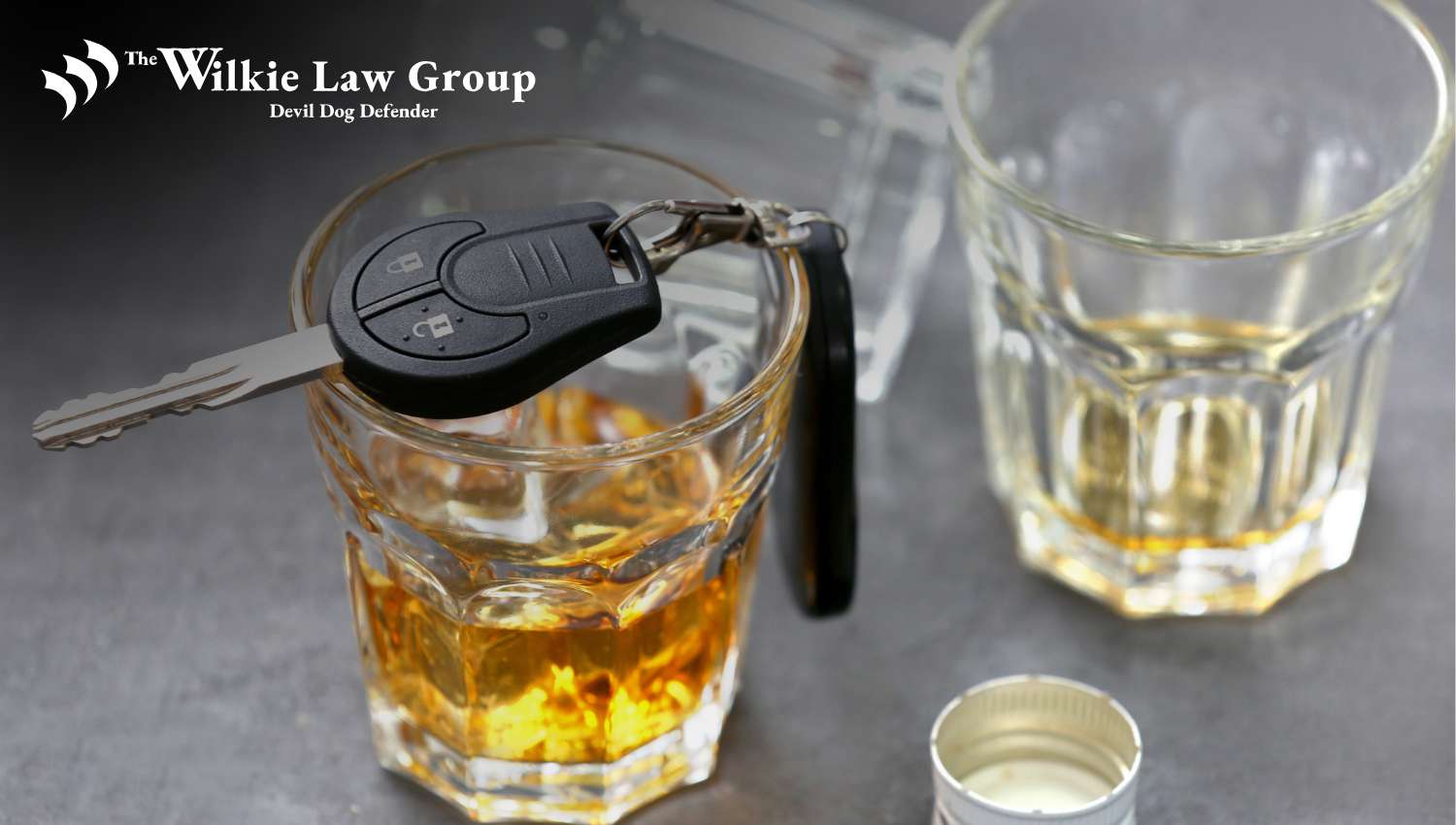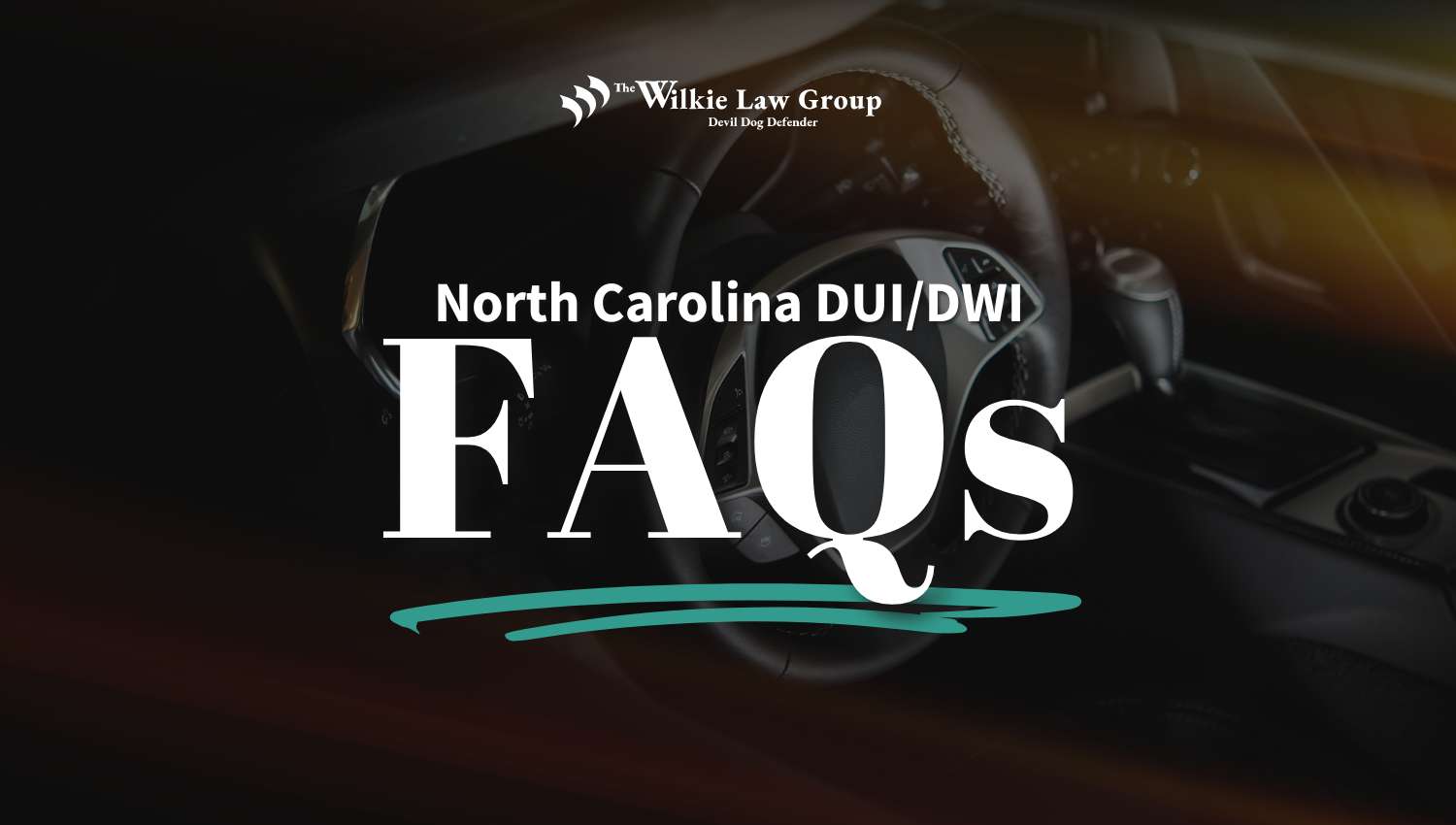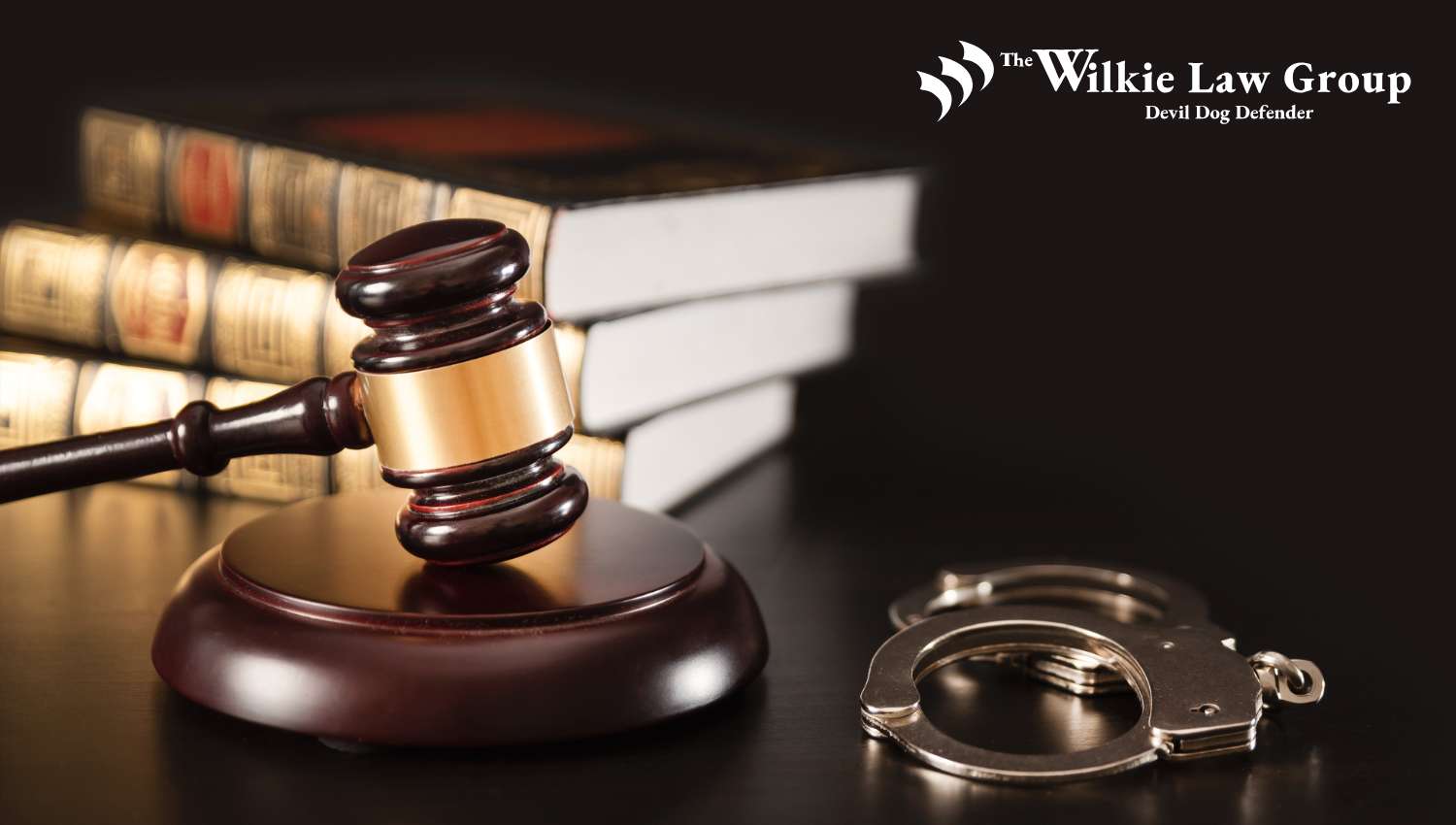DUI Lawyer Jacksonville, NC
Aggressive DWI Offense Attorney Serving Jacksonville, Wilmington, and Surrounding Areas
Home » Criminal Lawyers » DUI Lawyer
Practice Areas
If you’re searching for a DUI lawyer Jacksonville, NC, residents trust, you’ve come to the right place. At The Wilkie Law Group, we help individuals throughout Onslow County who are facing DUI charges and the serious legal consequences that come with them.
As a respected military and civilian criminal defense attorney and former member of the U.S. Marine Corps, Aden Wilkie brings extensive experience to every case he handles. Whether you were pulled over for a traffic violation, failed a field sobriety test, or are dealing with a prior DWI, Attorney Aden Wilkie is ready to fight for your rights.

Convictions for North Carolina DUI cases can lead to license suspension, fines, jail time, and long-term damage to your record, but you don’t have to face it alone. Our law firm provides aggressive DUI defense strategies to protect your freedom and driving privileges.
Call (910) 333-9626 or contact us online to schedule a consultation with a Jacksonville DUI defense attorney on our team today.
How Our Jacksonville DUI Lawyers Can Help
Choosing the right criminal defense team can make a big difference in how your case turns out. When facing DUI or DWI charges, it is important to have a criminal defense attorney with the proper training and legal experience.
One thing that sets Attorney Aden Wilkie apart from other criminal lawyers in Jacksonville, NC is his training in Standardized Field Sobriety Tests (SFSTs)—the same tests police officers use when making a drunk driving arrest. These tests are taught using guidelines from the National Highway Traffic Safety Administration (NHTSA), and very few DUI lawyers in the Jacksonville area have this level of training.
Because of his knowledge, Aden Wilkie knows precisely how these tests should be administered. If the officer made a mistake or skipped a step, Aden can spot it and use it to fight the prosecution’s case. These errors may impact the prosecution’s evidence and can be the difference between a DWI conviction and a case being dismissed or found not guilty.
Whether this is your first offense or you have a prior DWI on your record, having an experienced DWI defense lawyer from the beginning is key to a successful case outcome.

DUI and Military Personnel in Jacksonville, NC
For military personnel facing DUI charges in Jacksonville, NC, it’s important to understand that your case may involve more than just civilian court. The Uniform Code of Military Justice (UCMJ) also comes into play. If you’re charged with a DUI off base, you’ll likely face criminal charges in a North Carolina court, but your command may still take action under UCMJ Article 113. This means that even if civilian authorities handle your DUI case, the military can still impose separate penalties— including extra duty, loss of rank or pay, restriction to base, and even administrative discharge.
Marines stationed at Camp Lejeune and service members at Fort Bragg should be aware that a DWI conviction can also impact your security clearance and future career opportunities in the military. A DUI might suggest to your command that you’re unreliable or unfit for leadership roles, especially if alcohol abuse is suspected.
Because of the serious legal consequences involved, it’s critical to have a DWI defense lawyer who understands how military service affects your situation. Attorney Aden Wilkie, a former Marine and experienced military criminal defense attorney in Jacksonville, NC, knows how to handle the unique circumstances surrounding your case. The Wilkie Law Group is here to help you protect your record, your rank, and your future.
What is the Legal Limit in North Carolina?
In North Carolina, the legal limit for Blood Alcohol Concentration (BAC) depends on the type of driver in question.
For the vast majority of drivers, a BAC of 0.08% or higher is enough to be charged with a DWI. For commercial vehicle drivers, the limit is 0.04%. For drivers under the age of 21, North Carolina has a zero-tolerance policy, meaning a blood alcohol level of just 0.01% or higher can result in a DWI charge.
These limits are strictly enforced, and even slightly exceeding the legal limit can lead to serious consequences, such as license suspension, jail time, fines, and a permanent mark on your record.

DUI vs DWI in NC
There is no legal difference between a DWI and a DUI in North Carolina. While other states may separate the two terms, NC law treats both as the same offense. Whether you hear DUI (Driving Under the Influence) or DWI (Driving While Impaired), it all falls under the same law in this state.
A person can be charged with DWI if they are impaired by alcohol, illegal drugs, prescription medication, or any impairing substance that affects their ability to operate a motor vehicle safely. The focus is on whether the driver was impaired, regardless of what caused it.
In short, DUI and DWI mean the same thing in North Carolina. The official legal charge is DWI, and it applies to all situations involving drunk driving or driving under the influence of drugs.
Schedule 1 Controlled Substance DWI in North Carolina
You can also be convicted of a DWI in North Carolina if there’s any amount of a Schedule I controlled substance in your blood, even if you didn’t show signs of being impaired. This is known as a “per se” violation, meaning the state doesn’t have to prove that the driver was actually impaired at the time of the stop. Just having the substance in your system is enough for a DWI charge.
Schedule I drugs in North Carolina include, but are not limited to: opiates, heroin, LSD, MDMA, psilocybin mushrooms, and hallucinogens such as MDA, MDE, and MDEA.
North Carolina DUI Sentencing Levels
In North Carolina, DWI sentencing is divided into six levels: Level 5, Level 4, Level 3, Level 2, Level 1, and Aggravated Level 1, with Aggravated Level 1 being the most serious and Level 5 being the least. The sentence you receive depends on the specific facts of your case, including any aggravating or mitigating factors. Possible penalties include jail time, fines, community service, and license suspension.
Here is a breakdown of North Carolina’s DWI sentencing levels, which includes the statute under which they can be found, when the charges may be imposed, and potential penalties, including the maximum fines and minimum jail sentence to maximum jail sentence:
Level | Statute | When Imposed | Fine | Jail Time |
Aggravated 1 | N.C.G.S. § 20-179(f3) | 3 or more grossly aggravating factors present | Up to $10,000 | 12–36 months (no parole eligibility) |
1 | N.C.G.S. § 20-179(g) | Accompanied by a minor under 18, a person with mental/physical disability, or 2 grossly aggravating factors present | Up to $4,000 | 30 days–24 months |
2 | N.C.G.S. § 20-179(h) | 1 grossly aggravating factor, and no minor under 18 in the vehicle | Up to $2,000 | 7 days–12 months |
3 | N.C.G.S. § 20-179(i) | No grossly aggravating factors; aggravating factors outweigh mitigating factors | Up to $1,000 | 72 hours–6 months |
4 | N.C.G.S. § 20-179(j) | Aggravating and mitigating factors balance out, or none are present | Up to $500 | 48 hours–120 days |
| 5 | N.C.G.S. § 20-179(k) | Mitigating factors outweigh aggravating factors | Up to $200 | 24 hours–60 days |
Aggravating factors—like having a prior DWI, driving with a revoked license, or causing an accident—can lead to harsher penalties. On the other hand, mitigating factors, such as having a clean driving record, completing an alcohol assessment, or voluntarily enrolling in treatment, may reduce the severity of your sentence.
At The Wilkie Law Group, our DUI lawyers in Jacksonville, NC, work to build a strong DUI defense and fight for the lowest possible sentence based on the circumstances surrounding your arrest.
North Carolina DUI/DWI FAQs

What Happens When You Get a DUI For the First Time?
If you’re charged with a DUI for the first time in North Carolina, one of the first things you’ll face is license suspension. There are two types of suspension: a civil suspension right after your arrest, and a criminal suspension if you’re convicted. If your blood alcohol level is 0.08% or higher, or if you refuse to take a breath test, your license will be revoked for 30 days right away. This happens before your case even goes to court.
If you’re later convicted of DWI, your driver’s license will be revoked for one year. However, after 10 days, you may be eligible for a limited driving privilege, which lets you drive during certain hours for work, school, or household needs. To get your license back after the suspension, you’ll need to successfully complete an alcohol assessment and any recommended treatment program.
Is a DWI a Felony in NC?
Most DWI charges are treated as misdemeanors and fall within a five-level sentencing system, with Aggravated Level 1 being the most serious and Level 5 the least. However, there are situations where a DWI becomes a felony.
A DWI is charged as a felony in North Carolina if the driver is considered a habitual offender, which means having three or more prior DWI convictions within the past seven years. It also becomes a felony if the DWI led to an accident that caused someone’s personal injury or death.
Each prior DWI is considered an aggravating factor and can lead to harsher penalties. Because North Carolina is one of the strictest states when it comes to drunk driving laws, the legal consequences of even a single DWI conviction can be serious.
What is the Penalty for DWI in North Carolina?
In North Carolina, DWI offenses are divided into six levels. The potential penalties depend on the facts of your case, including prior offenses and other aggravating factors.
- Level 5: Up to 60 days in jail, a fine up to $200, and a 1-year license suspension. Community service and probation may replace jail time.
- Level 4: Up to 120 days in jail and a fine up to $500. Jail can be suspended with conditions like treatment programs or community service.
- Level 3: Up to 6 months in jail and a fine up to $1,000. Judges may allow probation or other alternatives.
- Level 2: 7 days to 12 months in jail and a fine up to $2,000. No option to avoid the minimum jail sentence.
- Level 1: 30 days to 24 months in jail and a fine up to $4,000.
- Aggravated Level 1: Anywhere between 12 months to 36 months in jail and up to $10,000 in fines. No chance of parole or early release.
Convictions can also lead to the permanent loss of your driver’s license and the seizure of your vehicle by the state. You’ll face significant fines, court costs, and a lasting criminal record that can affect your job, housing, and future opportunities.
What Happens to Your License After a DUI in North Carolina?
Your driver’s license can be suspended immediately if you're arrested for a DWI. This is known as a civil suspension, and it happens if your blood alcohol level is 0.08% or higher or if you refuse a breath test. This usually results in a 30-day license suspension right after the arrest.
If you’re convicted of DWI, your license will be revoked for 1 year on a first offense. However, you may qualify for a limited driving privilege after 10 days, which lets you drive to work, school, or medical appointments. Repeat offenders face much longer license suspensions, and in felony DWI cases, your license could be permanently revoked.
How Long Does a DWI Stay on Your Record in NC?
A misdemeanor DWI conviction stays on your driving record for 7 years. In felony DWI cases, the conviction stays on your record for 10 years. This means if you’re arrested again for drunk and reckless driving or other serious traffic offenses during this period, you could face more severe legal consequences.
Each additional DWI charge within this timeframe is considered a prior offense, resulting in higher fines, longer jail time, and extended license suspensions.
What is Aiding and Abetting a DWI in North Carolina?
You can be charged with aiding and abetting a DWI if you knowingly allow someone who is impaired to drive your vehicle. For example, if you hand your keys to someone you know—or should have known—was under the influence of alcohol or drugs, you could be held legally responsible.
Although this offense is typically punished as a level 5 DWI, it still counts as a conviction and carries the same punishments as any other level 5 DWI charge.
Can a DUI Be Expunged in North Carolina?
A DUI conviction cannot be expunged from your record in North Carolina. If you are found guilty of the crime, the charge will stay on your record permanently, impacting your job, housing, and future opportunities.
However, if your DUI case was dismissed or you were found not guilty, you may be eligible to have it expunged. A Jacksonville, NC expungement attorney like Aden Wilkie can help determine if you qualify for expungement and guide you through the legal process to clear your record.
Do I Need a Jacksonville, NC DWI Attorney?
Yes—if you’re facing DWI charges in North Carolina, it’s strongly recommended that you work with an experienced DWI defense attorney like Aden Wilkie. Trying to handle a DWI case on your own can lead to serious legal and financial consequences that could be avoided with the right representation. A qualified criminal defense attorney understands how to examine the details of your arrest and look for ways to challenge the prosecution’s evidence.
At The Wilkie Law Group, our legal team will investigate every part of your case, including:
- Whether there was a legal reason for the traffic citation
- If the officer properly read your Miranda rights
- How the field sobriety tests were given
- Whether the breathalyzer was calibrated and used correctly
- If the search and seizure followed proper legal procedures
These factors can make a big difference in the outcome of your DWI case. If anything was done incorrectly, it could weaken the entire case or even dismiss the charges against you.
Can a Criminal Defense Attorney Get You Out of Your DUI?
A skilled criminal defense attorney can often help you avoid the worst penalties that come with a DUI charge in North Carolina.
While every case is different, there may be opportunities to reduce or dismiss the charges, especially if there are problems with the prosecution’s evidence, the field sobriety tests, or how the traffic stop was handled.
Even if a conviction can’t be avoided, a Jacksonville DWI lawyer at The Wilkie Law Group may be able to negotiate for alternative sentencing, such as probation, community service, or a treatment program instead of time in jail. Our defense team will look closely at every detail of your case and explore potential defenses to protect your driving privileges, your record, and your future.
How Much Does a DUI Lawyer Cost in Jacksonville, NC?
The cost of a DUI lawyer in Jacksonville, NC, can vary based on several factors, including the severity of the charges, whether it’s a first offense or involves a prior DWI, and how complex the case is. Most attorneys' fees are charged at a flat rate or hourly, and expenses may include court costs.
While hiring a DUI lawyer is an investment, it can actually save you money in the long run by helping you avoid legal penalties and long-term financial consequences. To get a better estimate based on the circumstances of your case, call (910) 333-9626 to schedule a consultation with the criminal defense lawyers at The Wilkie Law Group today.

Facing DUI Charges? Turn to the Experienced Jacksonville, NC Criminal Defense Lawyers at The Wilkie Law Group
If you’re facing DWI charges in North Carolina, Aden Wilkie is the attorney you want on your side. As the lead attorney at our Jacksonville firm, he brings years of experience handling DWI and various other criminal charges in Onslow County, NC and beyond. Whether you’re a civilian or a service member, he’ll work to protect your rights, challenge the prosecution’s evidence, and minimize the potential penalties tied to your charges.
At The Wilkie Law Group, you’re not just getting a lawyer—you’re getting a leader who has served his country with honor and now serves his clients with the same dedication. Attorney Aden Wilkie, a former U.S. Marine, brings military discipline, sharp legal insight, and relentless commitment to every case.
While enrolled in law school, Wilkie was commissioned as a Second Lieutenant in the United States Marine Corps Reserve in 1998 and earned his Juris Doctor (J.D.) degree in 1999. His background in the military and extensive experience in civil litigation and criminal defense make him a powerful advocate for those facing serious charges.
In addition to being a trusted NC DWI attorney, Aden also provides experienced legal representation in other practice areas, including family law and military defense. Contact our law offices today to get the strong, personalized defense you deserve.
Call Aden Wilkie, Your Trusted Jacksonville DUI Lawyer
If you need strong legal representation from a locally owned and operated law firm that genuinely cares about your future, call The Wilkie Law Group at (910) 333-9626 or contact us online to schedule a consultation today.





